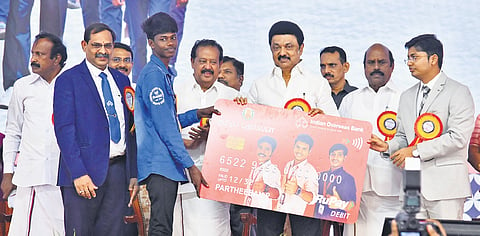

CHENNAI: Tamil Nadu is a top performer in higher education as validated by its Gross Enrolment Ratio of 47%, which is nearly twice the national average, and in number of higher education institutions proportionate to the population.
Such figures, however, mask some crucial issues ailing the sector like the financial situation of state-run universities, faculty vacancies, and quality of education and research.
To its credit, the DMK government led by Chief Minister M K Stalin has introduced impactful schemes like Naan Mudhalvan, Tamil Pudhalvan and Pudhumai Penn to encourage more students to enrol in higher education and upskill themselves.
For instance, Pudhumai Penn scheme which offers monthly scholarship of Rs 1,000 to women students has helped double the number of girl students in higher education from 2.09 lakh in 2022-23 to 4.06 lakh in 2024-25. Naan Mudhalvan, an upskilling initiative, is being implemented in 353 engineering colleges and 827 arts and science colleges.
The effective functioning of state-run universities, however, has been severely affected in the past few years due to the tussle between Governor R N Ravi and the TN government.
With the Supreme Court resolving this issue to a large extent through a landmark verdict last month, academicians expect the state to address the issues troubling higher education expeditiously.
Of the 22 state universities, 12 are functioning without a Vice-Chancellor and educationists say that it is imperative for the government to swiftly appoint persons of high academic and administrative repute to these posts at the earliest.
Though Rs 8,494 crore was allocated to higher education in the 2025-2026 budget, several state universities, including celebrated ones like University of Madras and Madurai Kamaraj University, are reeling under financial stress. Jurisdictional restriction imposed on these institutes by the University Grant Commission (UGC) in running distance education courses, which was a major source of revenue for them, was one of the key reasons for their financial struggle.
While the state has opposed to the National Education Policy 2020, lack of clarity on State Education Policy, which was planned as an alternative, and clear guidelines on what needed to be followed have affected the state universities’ ability to get grants from UGC which is gradually making implementation of certain aspects of NEP a prerequisite for release of funds.
The severe shortage of faculty in government arts and science colleges and universities compounds the crisis. There has been no recruitment of permanent teachers in over a decade, resulting in roughly 7,500 vacancies, which are managed by guest lecturers who are paid just Rs 25,000 a month.
Although the state rightly takes pride in having highest number of engineering colleges, the expose by NGO Arappor Iyakkam last year blew the lid on rampant malpractice of “ghost faculty,” in which same faculty members are shown as working in multiple colleges to meet minimum required staff strength on paper.
The state produced 3,206 PhD in 2020-21, highest in the country, but concerns have been raised about the quality of doctorates. It was also found that only 29.4% of 43,000 PhD scholars across 13 universities managed to finish their thesis within five years.
If the state wants to compete not just with other states, but with other countries, as the CM often says, it is important these issues are addressed quickly.